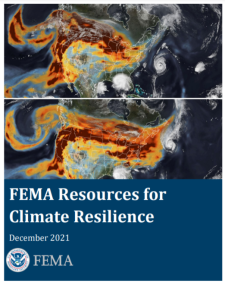
In December 2021 the Federal Emergency Management Agency (FEMA) published “FEMA Resources for Climate Resilience.” This publication provides a roadmap of FEMA programs and initiatives that advance community climate resilience. Building resilience is a long-term, ongoing process and this resource offers guidance for each step along the way – including funding opportunities, applicable FEMA programs, tools, and resources.




